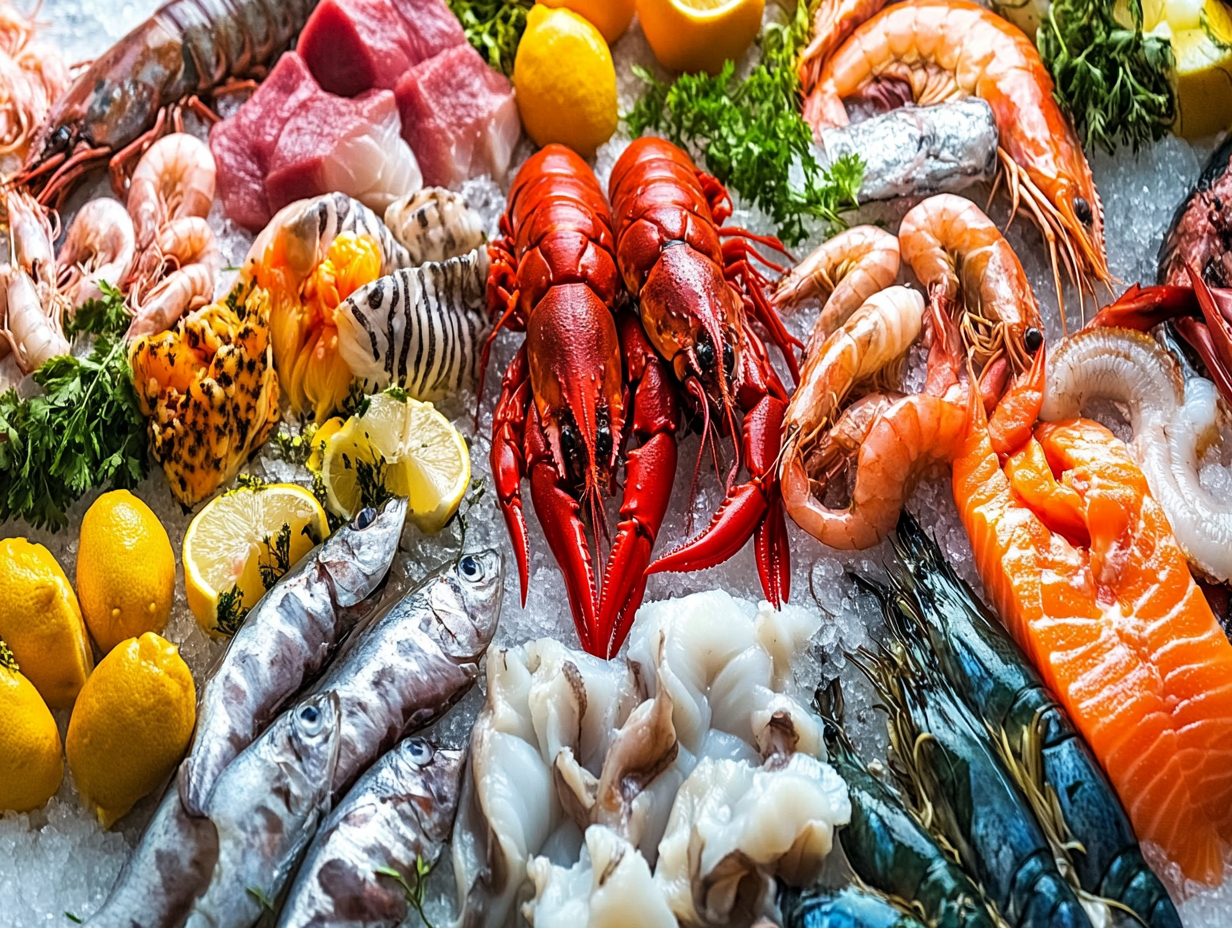【WPMの測定手順】
1. 読む前に設問を確認する
2. 時計(ストップウォッチ)を見ながら、英文を最初から最後まで読み、かかった秒数を記録する
3. 設問に解答する
4. 答え合わせをして正解数を確認する
以下の計算式でWPMを算出する
WPM = 語数 ÷ 読むのにかかった秒数 × 60 × 正解数 ÷ 設問数
※読んだ内容の理解を測定せずただ英文を読むスピードをチェックしたい場合は、WPM = 語数 ÷ 読むのにかかった秒数 × 60 まででOK。
Forever Chemicals in Seafood: A Growing Concern
Recent research suggests that seafood may contain high levels of “forever chemicals.” These are artificial substances that don’t break down easily and can remain in the human body for a long time. Exposure to these chemicals can cause various health problems, including cancer, liver and kidney damage, hormonal changes, and developmental issues in unborn babies.
Scientists from Dartmouth College in the United States believe that safety guidelines for these chemicals in seafood are necessary. They found that marine animals like shrimp, prawns, and lobster have the highest concentrations of these toxins. This discovery might make people who enjoy seafood, especially sushi, sashimi, and prawn cocktails, reconsider their eating habits.
Forever chemicals have been used since the 1950s in many products, particularly food packaging. They are commonly found in food wrappers, takeout containers, and pizza boxes. As a result, they have entered our food chain over time. The researchers noted that seafood had higher levels of these chemicals compared to other foods.
Professor Megan Romano, who led the study, emphasized that people shouldn’t stop eating seafood entirely. She explained that seafood is still a valuable source of lean protein and omega fatty acids. However, she stressed the importance of being aware of what’s in our food and understanding the potential risks associated with these chemicals. (214 words)
☆Answer the questions☆
(1) What are “forever chemicals” according to the text?
a) Natural substances b) Artificial substances that break down quickly c) Artificial substances that don’t
break down easily d) Harmless chemicals
(2) Which marine animals were found to have the highest concentrations of these toxins?
a) Tuna and salmon b) Cod and haddock c) Shrimp, prawns, and lobster d) Sardines and mackerel
(3) Where are forever chemicals commonly found besides seafood?
a) In the air b) In food packaging c) In soil d) In drinking water
(4) What advice does Professor Romano give regarding seafood consumption?
a) Stop eating seafood completely b) Eat more seafood c) Only eat cooked seafood d) Be aware of risks
but don’t stop eating seafood entirely

【全訳】シーフードに含まれる永遠の化学物質:増大する懸念
最近の研究によると、シーフードに「永遠の化学物質」が高濃度で含まれている可能性があることが示唆されています。これらは、簡単に分解されず、人体内に長期間残留する可能性のある人工物質です。これらの化学物質への曝露は、がん、肝臓や腎臓の損傷、ホルモンの変化、胎児の発達問題など、さまざまな健康問題を引き起こす可能性があります。
アメリカのダートマス大学の科学者たちは、シーフードに含まれるこれらの化学物質に関する安全指針が必要だと考えています。彼らは、エビ、エビ、ロブスターなどの海洋生物にこれらの毒素が最も高濃度で含まれていることを発見しました。この発見により、シーフード、特に寿司、刺身、エビのカクテルを楽しむ人々は、自分たちの食習慣を再考する必要があるかもしれません。
永遠の化学物質は1950年代から多くの製品、特に食品包装に使用されてきました。これらは食品ラッパー、テイクアウト容器、ピザの箱などによく見られます。その結果、時間とともに私たちの食物連鎖に入り込んできました。研究者たちは、シーフードが他の食品と比較してこれらの化学物質のレベルが高いことに注目しました。
研究を主導したメーガン・ロマーノ教授は、人々がシーフードを完全に食べるのを止めるべきではないと強調しました。彼女は、シーフードが依然として低脂肪タンパク質とオメガ脂肪酸の貴重な供給源であると説明しました。しかし、彼女は私たちの食べ物に何が含まれているかを認識し、これらの化学物質に関連する潜在的なリスクを理解することの重要性を強調しました。
【Answer】
(1) c) Artificial substances that don’t break down easily
解説:本文では、”forever chemicals”は「簡単に分解されない人工物質」と説明されています。
(2) c) Shrimp, prawns, and lobster
(3) b) In food packaging
(4) d) Be aware of risks but don’t stop eating seafood entirely
解説:ロマーノ教授は、シーフードを完全に食べるのを止めるべきではないが、これらの化学物質に関
連する潜在的なリスクを認識することの重要性を強調しています。
【入試超絶頻出単語】
□ research (研究) □ artificial (人工的な) □ substance (物質) □ exposure (曝露) □ damage (損傷) □ hormonal (ホルモンの)
□ developmental (発達の) □ guideline (指針) □ concentration (濃度) □ toxin (毒素) □ reconsider (再考する) □ packaging (包装)
□ food chain (食物連鎖) □ emphasize (強調する) □ valuable (貴重な) □ protein (タンパク質) □ fatty acid (脂肪酸) □ potential (潜在的な)
□ risk (リスク)







